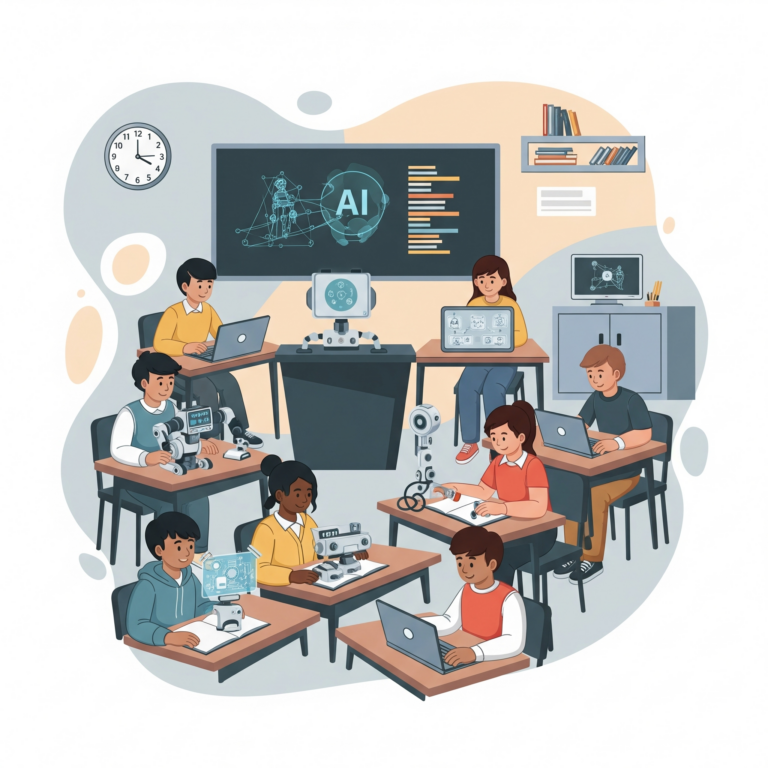- 🎓 Future-Proof Classrooms: How Schools Are Preparing Students for an AI-Driven World
- 🚀 Introduction: Teaching for a Future That Doesn’t Exist Yet
- 💻 1. Coding Is the New Second Language
- 🔍 2. AI Literacy: Understanding, Not Just Using
- 🧠 3. Critical Thinking and Creativity Matter More Than Ever
- 🌍 4. Equity and Access: Teaching All Kids, Not Just a Few
- 👩🏫 5. Teachers Are Becoming Tech Mentors — Not Just Lecturers
- 🔄 6. Lifelong Learning Starts Early
- ✅ Conclusion: Education Is Evolving — Just in Time
🎓 Future-Proof Classrooms: How Schools Are Preparing Students for an AI-Driven World
🚀 Introduction: Teaching for a Future That Doesn’t Exist Yet
Imagine a student graduating in 2035. The world they’ll enter will be powered by AI — from the cars they ride to the tools they use at work. But here’s the question:
Are today’s schools preparing them for that future — or for a world that’s already gone?
Around the globe, educators are rethinking what it means to be “ready for the real world.” And the new curriculum? It’s not just math and reading — it’s coding, critical thinking, ethics, and AI literacy.
Let’s explore how schools in 2025 are changing the way we learn — to help students thrive in a world powered by machines.
💻 1. Coding Is the New Second Language
Across elementary and secondary schools, coding is now being taught like English or math.
Students are learning not just how to use technology — but how to build it.
👩💻 From Scratch in 4th grade to Python in high school, kids are getting a hands-on education in algorithms, logic, and problem-solving.
Why? Because in an AI-driven world, those who can speak the language of machines have a massive advantage — whether they work in tech or not.
🔍 2. AI Literacy: Understanding, Not Just Using
It’s not enough to know how to use ChatGPT — students must understand how AI works, what it can do, and where it can go wrong.
That’s why forward-thinking schools are introducing:
- Courses on how AI models are trained
- Lessons on bias in algorithms
- Debates on ethical AI use
- Real-world projects using AI tools
💡 Example: A school in Finland has students analyze how social media algorithms shape what news they see — and how that affects their beliefs.
🧠 3. Critical Thinking and Creativity Matter More Than Ever
AI can solve problems — but it can’t think creatively, ask bold questions, or solve problems with empathy.
So schools are doubling down on:
- Creative writing and storytelling
- Problem-based learning
- Group collaboration
- Philosophy and ethics debates
🎨 The future job market won’t reward those who memorize facts — it will reward those who can think in ways AI simply can’t.
🌍 4. Equity and Access: Teaching All Kids, Not Just a Few
One big challenge? Not all schools have the same resources.
In wealthy districts, students have AI-powered tutoring tools, robotics labs, and computer science classes. But in lower-income areas, many schools are still struggling to get working laptops.
🏫 That’s why governments and NGOs are stepping in:
- Providing free AI education platforms
- Donating devices
- Training teachers in emerging tech
📢 AI shouldn’t widen the education gap — it should help close it.
👩🏫 5. Teachers Are Becoming Tech Mentors — Not Just Lecturers
The role of the teacher is evolving fast. No longer just a source of knowledge, today’s teachers are guides, coaches, and tech-savvy facilitators.
They’re learning to:
- Integrate AI into lesson planning
- Use real-time learning analytics
- Help students evaluate sources and spot fake content
- Encourage ethical discussions around tech use
👩🏫 A great teacher in 2025 doesn’t fight AI — they use it to unlock more personalized, powerful learning experiences.
🔄 6. Lifelong Learning Starts Early
Perhaps the most important lesson schools are teaching? That learning never ends.
In a world where jobs change rapidly and AI keeps evolving, students must learn how to learn, unlearn, and relearn.
That’s why modern education includes:
- Growth mindset training
- Online course skills
- Interdisciplinary exploration
- Resilience and adaptability workshops
🎯 The goal isn’t to prepare kids for a single job — it’s to prepare them for 10 different ones over a lifetime.
✅ Conclusion: Education Is Evolving — Just in Time
The future will be built by those who understand technology and humanity.
Schools that embrace this dual mission — teaching both hard skills and human values — are the ones truly preparing students for success.
In a world where AI can do so much, the question becomes:
What will only humans be able to do?
And the best schools? They’re helping students discover that answer every day.


